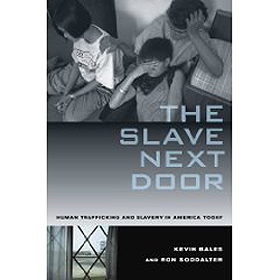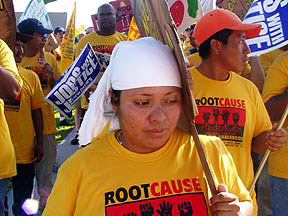
“The Slave Next Door: Human Trafficking and Slavery in America Today”
Here below is an extended excerpt from the new book on modern-day slavery by Kevin Bales and Ron Soodalter that takes a close look the CIW’s work to fight slavery in the fields.
The first paragraph below describes the barbaric conditions on the labor camps that were the focus of the CIW’s first major slavery case, a case that took five years to carry from investigation to sentencing:
“… Despite all the efforts being put forth by the CIW, and the dozens of witnesses and escapees who had come forward, life went on undisturbed in Flores’s camps. Many mornings, Sebastian Gomez woke the workers by firing his 9-millimeter semi-automatic Smith and Wesson pistol in the air, and his partner, Miguel Flores, would punctuate his curses in the fields with shots from his own gun. When vendors or visitors approached his camps, he drove them off by brandishing his pistol or firing over their heads. On one occasion, he shot out a visitor’s tires. Over the years, Flores was arrested periodically on firearms and abuse charges, and sometimes he was bailed out by the local growers for whom he supplied the workers. He was never prosecuted. Former Department of Labor Senior Investigator Armando Brana states, “In my files, I have seven reports of workers who disappeared or died while working for Flores. Even for those who were shot, it was listed as ‘death by natural causes.’ Some, it seemed, fell off a bridge, or were hit by a tractor or a bus….” Investigations were cursory. “In one case,” recalls Brana, “the coroner on the case was the farmer Flores was working for!”…”
 The story continues, describing the sentencing and the courageous testimony of CIW member Julia Gabriel (shown here on the right during the CIW’s “Root Cause” march in Miami, 2003), who would later be recognized for her valor with the 2003 Robert F. Kennedy Human Rights Award:
The story continues, describing the sentencing and the courageous testimony of CIW member Julia Gabriel (shown here on the right during the CIW’s “Root Cause” march in Miami, 2003), who would later be recognized for her valor with the 2003 Robert F. Kennedy Human Rights Award:
“… Finally, in October 1996, an indictment was brought in the U.S. District Court in South Carolina, against Miguel Flores, Sebastian Gomez, and two of their recruiters, on charges of conspiracy, involuntary servitude, extortion, illegal possession of a firearm, use of a firearm in the commission of a violent crime, transporting and harboring aliens, and unlawful entry into the United States after deportation. The judge considered the defendants a high flight risk, and ordered them held without bail.
In May 1997 – nearly five years after the CIW started its campaign against the Flores slavery ring – the defendants entered a plea of guilty. This left only the sentencing hearing. Julia Gabriel, the tiny woman with the big story to tell, came forward to speak for a severe sentence. She told her story, and that of friends and co-workers who had been threatened and brutalized, and when she finished, she said, “That’s what I saw. And everything they did to others, they had no compassion for them. A lot of people were hurt. And there were a lot of victims, because they were very sure of themselves, and they could do anything. And they took advantage of the people, and that’s why I’m here, so that they will receive a harsh sentence, because they hurt a lot of people…and these people did nothing to them. These people are victims….And now is the moment of sentencing, and what I want is for them to see that…if they are prisoners…they will see what they did to other people. And if they are given a short sentence then they can, once they are out…go for revenge, and no, that shouldn’t be. They are bad people. And that’s the truth I’m telling you.”
The court believed her. Flores and Gomez were each sentenced to 15 years in federal prison…”
The excerpt ends with an analysis of the significance of the Flores case, a seminal case in the movement to end modern-day slavery:
“… The conviction of Flores was a landmark case, and instrumental in bringing about the Victims of Trafficking and Violence Protection Act in 2000, with its sets of definitions, charges and penalties for dealing specifically with cases of sex and labor slavery in the United States. And from a time when, in the words of (federal agent) Mike Baron, “you could fit the whole anti-slavery movement in the back of my patrol truck,” it helped spark the anti-human trafficking effort in the country today. Baron is lavish in his praise of the Coalition’s efforts: “If law enforcement had the same dedication and tenacity as the CIW, and weren’t bound by our restrictions, there wouldn’t be a place for the criminals to hide. They maintained contact with the workers, and tracked the movements of the crew leaders. Without the CIW, we wouldn’t have had any witnesses; we never would have found the victims.”
Click here for a more extended excerpt from the new book, and here to purchase a copy today.
